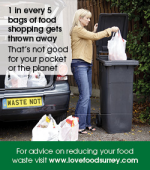
|
20th December 2011
Chairman's Corner
Help support Surrey's food waste campaign this Festive Season
WRAP research has identified confusion over date labelling as one of the causes of this. Secretary of State for the Environment, Rt. Hon Caroline Spelman said as Defra published new guidance for food and drink manufacturers that “clearer date labels will help shoppers save money and stop perfectly good food being thrown away. We want to end the food labelling confusion and make it clear once and for all when food is good and safe to eat. This simpler and safer date labelling guide will help households cut down on the £12 billion worth of good food that ends up in the bin”. Under the guidance, food packaging should only carry either a ‘use-by’ or ‘best-before’ date. ‘Sell-by’ and ‘display-until’ labels used for stock rotation should be removed to avoid confusion for shoppers, with retailers finding different ways of stock control. ‘best before’ will be appropriate for the vast majority of foods and indicates the period for which a food can reasonably be expected to retain its optimal condition (e.g. it will not be stale) and so relates to the quality of the food. Foods likely to require only a ‘best-before’ date include biscuits, jams, pickles, crisps and tinned foods. ‘Use by’ is the required form of date mark for those foods which are highly perishable from a microbiological point of view and which are in consequence likely after a relatively short period to present a risk of food poisoning, and so relates to the safety of the food. Foods likely to require a ‘use-by’ date include soft cheese, ready-prepared meals and smoked fish. Food wasted in the UK increases by a massive 80% during the Christmas period, according to statistics revealed by the National Love Food Hate Waste Campaign. This equates to 230,000 tonnes of good food being thrown away worth around £275m so we are encouraging Surrey households to become more waste aware this Christmas to save money on their festive food bill and help Surrey’s environment. Kevin Daley (Chair, MFGD Society) |
 Cutting down on food waste can be a challenge, especially when time is short and kids don’t always want to eat what's been cooked for them. In order to help residents waste less,
Surrey Waste Partnership’s
Cutting down on food waste can be a challenge, especially when time is short and kids don’t always want to eat what's been cooked for them. In order to help residents waste less,
Surrey Waste Partnership’s 